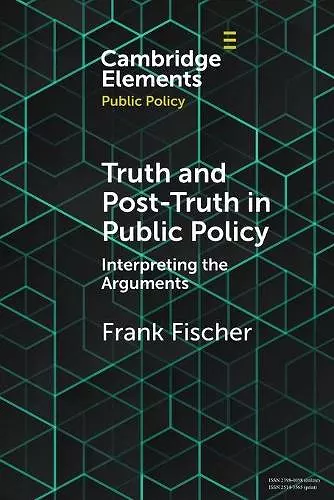Truth and Post-Truth in Public Policy
Format:Paperback
Publisher:Cambridge University Press
Published:9th Dec '21
Currently unavailable, and unfortunately no date known when it will be back

This Element analyses the phenomenon of post-truth and how it poses a problem for the public policy-oriented sciences.
This Element shows that the effort to understand the phenomenon of post truth has to go beyond the emphasis on facts to include an understanding of the social meanings that get attached to facts in the political world of public policy.The phenomenon of post-truth poses a problem for the public policy-oriented sciences, including policy analysis. Along with “fake news,” the post-truth denial of facts constitutes a major concern for numerous policy fields. Whereas a standard response is to call for more and better factual information, this Element shows that the effort to understand this phenomenon has to go beyond the emphasis on facts to include an understanding of the social meanings that get attached to facts in the political world of public policy. The challenge is thus seen to be as much about a politics of meaning as it is about epistemology. The analysis here supplements the examination of facts with an interpretive policy-analytic approach to gain a fuller understanding of post-truth. The importance of the interpretive perspective is illustrated by examining the policy arguments that have shaped policy controversies related to climate change and coronavirus denial.
'With 'Truth and Post-Truth in Public Policy - interpreting the arguments', Frank Fischer offers us a powerful framework of critical analysis to unravel the complex thread that has brought us to the current and extreme situation of strong social confrontation … It is a book that not only feeds the debate, but our hopes.' Rosana Boullosa, Critical Policy Studies
'Fischer guides readers through a systematic and artfully argued application of the interpretive policy framework, offering not only a nuanced discussion about post-truth but also a tour of the workings of the framework (e.g., the concepts of social cognition, plausibility structures, truth regimes, and narrative arguments). As such, this is both a contribution to scholarship and a useful text for those seeking to learn more about the framework itself. Readers will benefit from Fischer's multi-disciplinary and critical theoretical perspective, sharpened over a career of provocative research about public participation and expert knowledge in policymaking. Above all, the book is a highly enjoyable and fluid read that not only provides an appraisal of where policy research currently sits in understanding post-truth but also establishes a roadmap for that research in the coming decades.' Kris Hartley, International Review of Public Policy
ISBN: 9781108796071
Dimensions: 229mm x 151mm x 7mm
Weight: 160g
75 pages